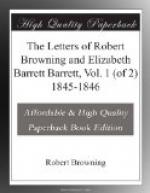Yours ever,
R.B.
[Footnote 1: The following is the version of the passage in Mrs. Browning’s later translation of the ‘Prometheus’ (II. 247-251 of the original):
Prom. I did restrain besides
My
mortals from premeditating death.
Cho. How didst thou medicine the plague-fear of death?
Prom. I set blind hopes to inhabit in their house.
Cho. By that gift thou didst help thy mortals well.]
E.B.B. to R.B.
March 5, 1845.
But I did not mean to strike a ‘tragic chord’; indeed I did not! Sometimes one’s melancholy will be uppermost and sometimes one’s mirth,—the world goes round, you know—and I suppose that in that letter of mine the melancholy took the turn. As to ’escaping with my life,’ it was just a phrase—at least it did not signify more than that the sense of mortality, and discomfort of it, is peculiarly strong with me when east winds are blowing and waters freezing. For the rest, I am essentially better, and have been for several winters; and I feel as if it were intended for me to live and not die, and I am reconciled to the feeling. Yes! I am satisfied to ‘take up’ with the blind hopes again, and have them in the house with me, for all that I sit by the window. By the way, did the chorus utter scorn in the [Greek: meg’ ophelema]. I think not. It is well to fly towards the light, even where there may be some fluttering and bruising of wings against the windowpanes, is it not?
There is an obscurer passage, on which I covet your thoughts, where Prometheus, after the sublime declaration that, with a full knowledge of the penalty reserved for him, he had sinned of free will and choice—goes on to say—or to seem to say—that he had not, however, foreseen the extent and detail of the torment, the skiey rocks, and the friendless desolation. See v. 275. The intention of the poet might have been to magnify to his audience the torment of the martyrdom—but the heroism of the martyr diminishes in proportion—and there appears to be a contradiction, and oversight. Or is my view wrong? Tell me. And tell me too, if AEschylus not the divinest of all the divine Greek souls? People say after Quintilian, that he is savage and rude; a sort of poetic Orson, with his locks all wild. But I will not hear it of my master! He is strong as Zeus is—and not as a boxer—and tender as Power itself, which always is tenderest.




